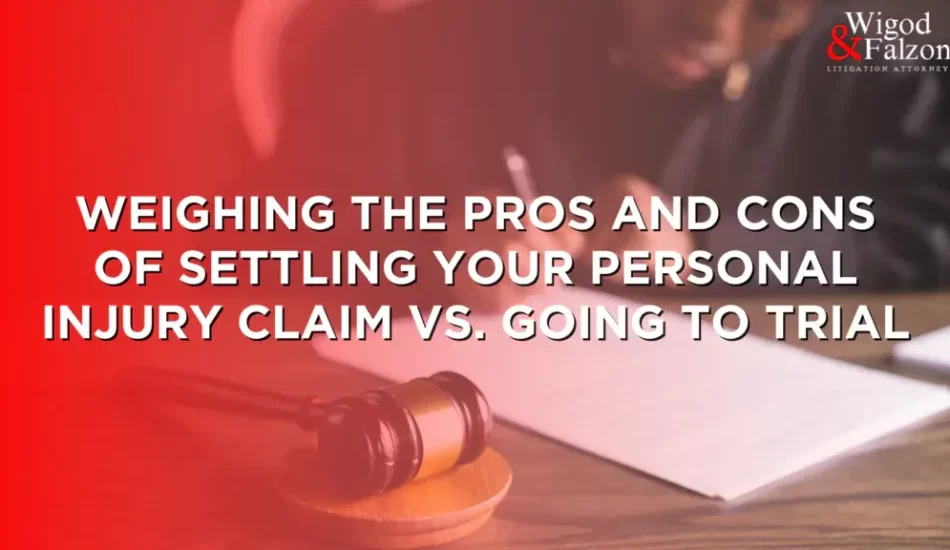|
|
Last Modified on Jan 23, 2025
When it comes to personal injury claims, one of the most important decisions a plaintiff must make is whether to accept a settlement or proceed to trial.
Depending on the circumstances, each option has its advantages and potential drawbacks. That’s why understanding the differences between settling a personal injury claim and going to trial is crucial for making an informed decision.
Below, we highlight what you should know about settlements vs. going to trial in a personal injury case.
Pros of Settling a Personal Injury Claim
In many personal injury cases like slip and fall, lead poisoning, dog bites and more, settlements are the preferred outcome for both plaintiffs and defendants.
A settlement is an agreement reached between the parties involved, where the plaintiff agrees to accept a certain amount of financial compensation in exchange for dropping the lawsuit against the defendant.
Here are some key benefits of choosing a settlement:
1. Speed and Efficiency
Settlements can offer a faster resolution to a personal injury case. Court trials can take months or even years to conclude, whereas settlements can be reached relatively quickly.
This expeditious process allows plaintiffs to receive compensation sooner and move forward.
2. Cost Savings
Going to trial involves significant legal expenses, including attorney fees and court costs. In contrast, settlements can be more cost-effective, since they often require less time and resources to negotiate.
With a settlement, plaintiffs can potentially avoid the financial burden of an extensive trial.
3. Certainty and Control
By accepting a settlement, plaintiffs have more control over the claim’s outcome. They can negotiate the terms of the settlement and have a clearer understanding of the compensation they will receive.
Settling can provide plaintiffs with peace of mind and certainty, avoiding the unpredictability that comes with a trial and potential appeal processes.
Cons of Settling
While settlements offer various advantages, it’s important to consider some potential drawbacks:
1. Potential Undervaluing of Claims
In some cases, defendants may offer lower settlement amounts than what plaintiffs could potentially receive through a trial.
It’s crucial to work closely with an experienced personal injury attorney who can assess the true value of your claim and negotiate a fair settlement on your behalf.
2. Confidentiality
Depending on the terms of the settlement, plaintiffs may have to agree to keep the details of the settlement confidential.
While this may be advantageous for some, as it protects privacy and prevents public scrutiny, others may prefer the transparency that comes with a public trial.
Pros of Going to Trial
Opting to go to trial in a personal injury case means allowing a jury to decide on the merit of your claim and the amount of compensation you may receive.
Here are some factors to consider when considering going to trial:
1. Potential for Higher Compensation
Jury verdicts in personal injury cases have the potential to award plaintiffs higher compensation than what may be offered in a settlement.
Going to trial allows plaintiffs to present their case to a jury and have their story heard, potentially resulting in more substantial financial recovery. Additionally, you may also receive punitive damages if your case involves recklessness, gross negligence, and other forms of misconduct.
2. Setting Legal Precedent
In some cases, going to trial can set legal precedents and impact similar future cases.
A favorable judgment can establish legal principles that benefit not only the plaintiff, but also others who may face similar situations in the future.
Cons of Going to Trial
Just like settlements, going to trial has its own cons to consider:
1. Time and Effort
Trials can be time-consuming and demanding. Plaintiffs must be prepared to dedicate significant time and effort to the litigation process.
Additionally, trials involve uncertainties, and there is always a chance of an unfavorable outcome.
2. Emotional Toll
Trials can be emotionally challenging for plaintiffs. Testifying and reliving the events leading to the injury can be stressful and traumatic.
Plaintiffs must carefully consider their emotional preparedness before proceeding to trial.
The Bottom Line
To sum it up, settlements offer speed, savings, and control but might undervalue claims and restrict confidentiality.
Going to trial can mean more compensation and legal precedent but comes with time, effort, and emotional strain. Therefore, your decision should be based on your unique situation.
Seek advice from an experienced personal injury attorney to understand your options thoroughly and make the right choice for your case.
Where to Find Help With Your Personal Injury Claim
Navigating a personal injury case and deciding the best route to take can be complex and stressful. Wigod & Falzon is here to help you through the process and work tirelessly to get you the justice you deserve; no matter which route you choose.
Remember; we work on a contingency fee basis for personal injury claims, which means no recovery = no fee. Contact us today for high-quality legal guidance from an expert team of attorneys.





